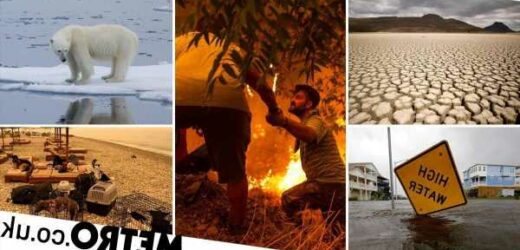Devastating impacts of climate change are now ‘unavoidable’, a damning United Nations report released today warned.
It is ‘unequivocal’ that human activity is warming the planet, causing ‘unprecedented’ changes to land, atmosphere and oceans, top scientists have cautioned in the landmark 2021 study.
The long-awaited document references more than 14,000 scientific papers and has involved 234 authors from around the world.
Executive Director of the UN Environment Programme, Inger Andersen said today ‘nobody’s safe, and it’s getting worse faster’.
UN secretary general Antonio Guterres has named the situation a ‘code red for humanity’, urging countries to step up efforts to cut emissions in this decade.
He said: ‘The alarm bells are deafening, and the evidence is irrefutable: greenhouse gas emissions from fossil fuel burning and deforestation are choking our planet and putting billions of people at immediate risk.
‘Global heating is affecting every region on Earth, with many of the changes becoming irreversible. The internationally agreed threshold of 1.5C is perilously close.’
So, what are the key findings from the alarming report? Join Metro.co.uk as we take a look.
– It is ‘unequivocal’ that human activity has warmed the atmosphere, ocean and land – with widespread and rapid changes across the planet.
– A number of the consequences are ‘unprecedented’ over many centuries to many thousands of years, with Earth warming at a rate unprecedented in at least 2,000 years.
– Carbon dioxide levels in the atmosphere haven’t been as high for three million years.
– Methane concentrations are higher than they have been for 800,000 years.
– Rises in both greenhouse gases are well above natural changes seen for hundreds of thousands of years.
– Human activities like burning fossil fuels and deforestation have resulted in average temperatures being nearly 1.1C higher in the last decade when compared to pre-industrial times.
– There is strong evidence of climate change in every area across the world – including more frequent or intense heatwaves, heavy rain, droughts and tropical cyclones – and the role humans play in driving the changes.
– Humans very likely bear responsibility for the global retreat of glaciers, decline in sea ice, warming oceans and rising sea levels. The rate of sea level rise is speeding up.
– The world will reach or exceed 1.5C of warming over the next two decades as global surface temperatures continue to increase until at least mid-century.
– Global warming of 1.5C and 2C – limits countries have committed to in order to avoid the most dangerous impacts of climate change – will be exceeded in the 21st century unless heavy reductions in carbon dioxide and other greenhouse gas emissions happen in the coming decades.
– Continued warming will drive increases in the frequency and intensity of hot extremes, marine heatwaves, heavy rain, droughts in some regions, the proportion of intense tropical cyclones, and reductions in Arctic sea ice, snow cover and permafrost.
– Every additional increment of warming causes larger changes in extremes, with every extra 0.5C temperature rises leading to clear increases in the intensity of heatwaves, heavy rain that can cause flooding, and droughts.
– Under scenarios for the future with increasing carbon dioxide emissions, the ocean and land carbon sinks such as forests are projected to be less effective at slowing the accumulation of the greenhouse gas in the atmosphere.
– Changes to oceans, sea levels and melting permafrost and glaciers are irreversible for decades, centuries or even millennia as a result of past and future warming.
– Strong, rapid and sustained reductions in emissions of methane would help curb warming, and would also improve air quality.
Get in touch with our news team by emailing us at [email protected].
For more stories like this, check our news page.
Source: Read Full Article




